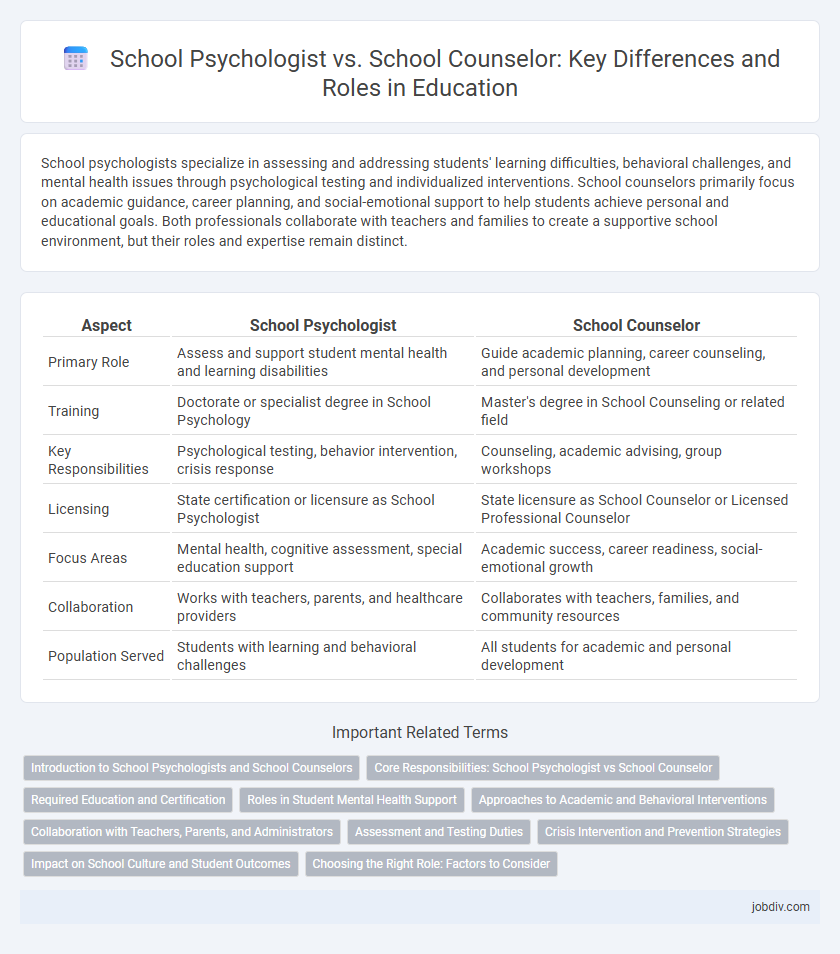School psychologists specialize in assessing and addressing students' learning difficulties, behavioral challenges, and mental health issues through psychological testing and individualized interventions. School counselors primarily focus on academic guidance, career planning, and social-emotional support to help students achieve personal and educational goals. Both professionals collaborate with teachers and families to create a supportive school environment, but their roles and expertise remain distinct.
Table of Comparison
| Aspect | School Psychologist | School Counselor |
|---|---|---|
| Primary Role | Assess and support student mental health and learning disabilities | Guide academic planning, career counseling, and personal development |
| Training | Doctorate or specialist degree in School Psychology | Master's degree in School Counseling or related field |
| Key Responsibilities | Psychological testing, behavior intervention, crisis response | Counseling, academic advising, group workshops |
| Licensing | State certification or licensure as School Psychologist | State licensure as School Counselor or Licensed Professional Counselor |
| Focus Areas | Mental health, cognitive assessment, special education support | Academic success, career readiness, social-emotional growth |
| Collaboration | Works with teachers, parents, and healthcare providers | Collaborates with teachers, families, and community resources |
| Population Served | Students with learning and behavioral challenges | All students for academic and personal development |
Introduction to School Psychologists and School Counselors
School psychologists specialize in assessing and addressing students' cognitive, emotional, and behavioral needs through psychological testing and intervention strategies. School counselors focus on academic guidance, college and career readiness, and social-emotional support, providing individual and group counseling services to foster student development. Both roles collaborate with educators and families to enhance student well-being and promote a positive school environment.
Core Responsibilities: School Psychologist vs School Counselor
School psychologists specialize in assessing and addressing students' cognitive, emotional, and behavioral needs through psychological testing and intervention plans, focusing on mental health and learning disabilities. School counselors primarily provide academic guidance, career planning, and social-emotional support to help students navigate school challenges and personal development. Both roles collaborate with educators and families to create supportive environments, but psychologists emphasize diagnostic assessments while counselors prioritize direct student consultation and group counseling.
Required Education and Certification
School psychologists typically require a specialist-level degree such as an Ed.S. or a master's with additional certification, along with state licensure or certification as a school psychologist. School counselors must hold a master's degree in school counseling or a related field and obtain state licensure or certification specific to school counseling. Both roles necessitate clinical internships or supervised practice hours to meet certification standards and effectively support student mental health and academic success.
Roles in Student Mental Health Support
School psychologists specialize in assessing and diagnosing learning disabilities, behavioral issues, and mental health conditions to develop individualized intervention plans for students. School counselors provide direct mental health support through counseling, crisis intervention, and promoting social-emotional learning and college readiness. Both professionals collaborate with teachers, parents, and administrators to create a supportive environment that addresses students' psychological and emotional well-being.
Approaches to Academic and Behavioral Interventions
School psychologists utilize comprehensive assessments and evidence-based interventions to address both academic challenges and behavioral issues, often collaborating with teachers and parents to develop individualized support plans. School counselors focus on providing direct counseling services, promoting social-emotional learning, and facilitating group activities to enhance students' academic motivation and behavioral skills. Both professionals play crucial roles in fostering a supportive school environment but differ in their specialized methods and intervention strategies.
Collaboration with Teachers, Parents, and Administrators
School psychologists collaborate with teachers, parents, and administrators to assess student needs, develop individualized intervention plans, and monitor progress to enhance academic and emotional outcomes. School counselors work closely with these stakeholders to provide guidance on academic planning, social skills development, and crisis intervention, ensuring holistic student support. Both professionals foster a coordinated approach to address behavioral challenges and promote a positive school environment.
Assessment and Testing Duties
School psychologists specialize in conducting comprehensive psychoeducational assessments, including cognitive, behavioral, and emotional testing, to identify learning disabilities and mental health conditions. They utilize standardized instruments such as the WISC-V or BASC-3 to develop individualized education plans (IEPs) and recommend interventions. School counselors focus more on academic and career guidance assessments, employing tools like interest inventories and achievement tests to support student planning and social-emotional development.
Crisis Intervention and Prevention Strategies
School psychologists specialize in crisis intervention by conducting risk assessments and developing evidence-based prevention strategies tailored to students with mental health challenges. School counselors focus on providing immediate emotional support, facilitating communication between students, families, and staff, and implementing proactive programs to prevent crises. Both professionals collaborate to create safe school environments through targeted interventions and ongoing mental health education.
Impact on School Culture and Student Outcomes
School psychologists apply specialized psychological assessment and intervention strategies to address students' academic, social, and emotional challenges, fostering a positive school climate and improving individual student outcomes. School counselors focus on academic guidance, career planning, and personal development, enhancing student engagement and promoting a supportive environment that encourages resilience and success. Both professionals collaboratively influence school culture by implementing data-driven programs that boost mental health awareness, reduce behavioral issues, and support student achievement.
Choosing the Right Role: Factors to Consider
When choosing between a school psychologist and a school counselor, consider the specific student needs and services each role provides; school psychologists specialize in psychological assessments, interventions, and mental health evaluations, while school counselors focus on academic guidance, career planning, and social-emotional support. Factors such as the school's size, budget, and student population can affect the availability and scope of these professionals. Understanding these distinctions ensures the right support is matched to students' academic, emotional, and behavioral development.
School Psychologist vs School Counselor Infographic

 jobdiv.com
jobdiv.com